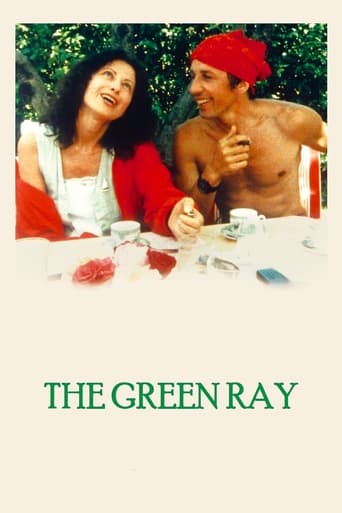colinbellUK
I already liked this film a lot having owned it on DVD as part of a great value Rohmer box set. However when the opportunity came up to see it at the cinema today I couldn't pass it up. This film and others by the same director have influenced other films which I like a lot (e.g. Before Sunrise/ Before Sunset) in that there is little action but lots of conversation, some interesting, some banal. I identified strongly with the quiet introvert lead character Delphine, who was misunderstood by her friends and given all sorts of advice on finding a partner which wouldn't be suitable for her at all. The performance by Marie Riviere was wonderful and she contributed to the dialogue too (she has a credit shared). Lots of times she had subtle facial expressions going on which spoke volumes and it made me wish I spoke French as when I kept looking to the subtitles I knew in the time I was reading them I was missing some of those. Even the silences (or just bouts of tears) spoke volumes. I won't reveal too much of the plot except to say it has a hopeful feeling towards the end and the whole thing appealed very much to the romantic in me.
Franny Cello
This film is, no doubt, about loneliness and emptiness. But not in the casual meaning. The protagonist - Delphine can be seem in look for a guy - in order to be happy, to enjoy the life. But not, really. She is not looking for a guy or, anybody, anything. Name it either "she doesn't want to confess herself that she need somebody in her life to be happy, or understand it in the opposite meaning. I think, she is not, at the same time, is in search. As we see in the movie, she rings some people hoping to spend her vacation with. But the only one she is looking for, is she herself. In her personage, we can see ourselves. Eric Rohmer wanted to express the whole human being's purpose of life in the frames of one single personage's expressions. Everybody is looking for - not anybody or anything, but themselves. And this is about (maybe endless) search. Happy people achieve it, but not everybody, unfortunately... For movie: 10 of 10.
cronostitan
2 middle-classes of the french bourgeoisie choose to put themselves in a couple. OK. But or is the intrigue (in fact moreover rather flat) or still the suspense? Because, to say to you, even the last one of the sentimental and droopy novels contains it! Or then it is really necessary to love Rohmer - what, I dare to say it, is not the case of your personal servant...Are the love marriages so frequent since the Middle Ages? And still, if it was about a couple LGBT, maybe the measurement would win in originality and even in true life! Inside the movie, the girl is so prudish and stuck,cornered that we could believe that the story is about this maid of the priest: Le Rayon Vert (The Green Beam) reminds me these weak series of the 80's full of love stories. The Hell between all couples is nevertheless a good subject, each knows that the total happiness does not exist and, on the other hand lonesome people are often pretext in good climaxes. So why be proud to be so common over the rainbow, I do not understand, anyway this great green beam that we see sometimes in the wide in Brittany shores deserves a lot more clairvoyance.
cwarne_uk
Eric Rohmer has fashioned a film that perfectly mirrors the main character Delphine. It is by turns annoying, insightful and moving. With improvised dialogue the film has a more naturalistic feel than some of Rohmers other work, he also shows more interest in nature than usual making this one of his more interesting films to look at. Delphine, brilliantly played by Marie Riviere, is lonely (and seemingly pining for her ex-fiancé) and her attempts at a vacation form the body of the film. She travels to various places but not until the end does she find something like happiness. She can be very maddening - ignoring people (presumably because they are "not the right sort" - just plain rude to my mind), and lecturing a family on her vegetarianism as they tuck into lamb chops. She does though seem a very real person, and many viewers will find themselves rooting for her anyway - she is like many people we know in being full of faults but you still like them anyway. The greatest weakness of the film is that for all her self-absorption Rohmer does not really provide any evidence of self-insight or change (a serious fault in that drama is all about characters changing), Delphine talks a lot about her problems but her explanations often struck me as trite. An oddity among his output, this should be seen by any Rohmer fan, I would not recommend it as an introduction though. (The mark of 6 may seem low by inflated IMDb standards but it is relative to Rohmers other films).







